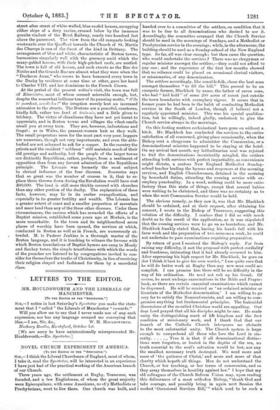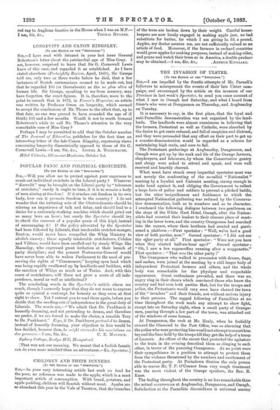NOVEL CHURCH EXPERIMENT IN AMERICA.
ITO TRE EDITOR OF TEE " SPECTATOR....1
Sut,—I think the Liberal Churchmen of England, most of whom, I take it, read the Spectator, will be interested in an experience I have just had of the practical working of the American branch of our Church.
Three years ago, the settlement at Rugby, Tennessee, was founded, and a few Englishmen, of whom the great majority were Episcopalians, with some Americans, Inc st'y Methodists or Presbyterians, went to live there. One church was built, and handed over to a committee of the settlers, on condition that it was to be free to all denominations who desired to use it. Accordingly, the committee arranged that the Church Service should be used in the mornings of Sundays, and a Methodist or Presbyterian service in the evenings; while, in the afternoons, the building should be used as a Sunday-school of the New-England type. So far, all was clear enough ; but then came the question, who would undertake the services ? There was no clergyman or regular minister amongst the settlers,—they could not afford to pay one ; and the experience of the first few months showed that no reliance could be placed on occasional clerical visitors, or missionaries, of any denomipation.
The settlers accordingly, like sensible folk, chose the best man amongst themselves "to fill the bill." This proved to be an energetic farmer, Blacklock by name, the father of seven sons, who had "laid hold" of some 200 acres of forest just outside the town boundaries with exemplary vigour. It seems that in former years he had been in the habit of conducting Methodist services in the South of London, though (I believe) not a regularly appointed minister. This was his special qualifica- tion, but he willingly, indeed gladly, undertook to give the Church service always in the mornings.
On this footing matters ecclesiastical have gone on without a hitch. Mr. Blacklock has conducted the services to the entire satisfaction of all concerned, giving place occasionally, when the Bishop sent a clergyman to administer the Communion, or a denominational minister happened to be staying at the hotel. On my arrival last month, my latitudinarian soul was rejoiced to find the denominations inextricably mingled, the settlers attending both services with perfect impartiality, as convenience might dictate, a zealous New England Methodist Sunday- school teacher leading the hymns and responses at the morning services, and English Churchwomen, detained in the morning by household duties, attending the evening service with ex- emplary punctuality. In a word, nothing could be more satis- factory than this state of things, except that several babies were waiting to be christened, and there was no certainty as to when the next Communion Service would be held.
The obvious remedy, as they saw it, was that Mr. Blacklock should be ordained, and at their request, after obtaining his consent, I wrote to the Bishop of Tennessee, suggesting this solution of the difficulty. I confess that I did so with much doubt as to the result of the application, as it was stipulated that the evening services were to go on as heretofore, and Mr. Blacklock frankly stated that, having his hands full with his farm work and the preparation of two sermons a week, he could not undertake to pass examinations requiring preparation.
By return of post I received the Bishop's reply. Far from raising any difficulty, it met the proposal with perfect cordiality' and frankness, intimating that it had already occurred to him. After expressing his high respect for Mr. Blacklock, he goes on (for I think it best to give his own words)," I am quite sure that he will do better work at Rugby than any new man could ac- complish. I can promise him there will be no difficulty in the way of his ordination. He need not rub up his Greek. Of course, he must undergo examinations in the Bible and Prayer- book, as there are certain canonical examinations which cannot be dispensed. He will be received as an ordained minister or licentiate of the Methodist denomination.' I am willing to go very far to satisfy the Nonconformists, and am willing to com- promise anything but fundamental principles. The fratricidal dissensions of the so-called Christian world are appalling. Our dear Lord prayed that all his disciples might be one. He made unity the distinguishing mark of hits kingdom and the first condition of missionary work, and I thank God that our branch of the Catholic Church interposes no obstacle to the most substantial unity. The Church system is large enough to comprehend all those who love the Lord in sin- cerity True it is that if all denominational distinc- tions were forgotten, or buried in the depths of the sea, no truth essential to the soul's salvation would be lost, nor any the smallest necessary troth destroyed. We need more and more of 'the patience of Christ,' and more and more of that charity which hopeth all things. Men do not understand the Church, or her teaching, or her terms of communion, and so they array themselves in hostility against her." I hope that my old colleagues of the Church Reform Union may, upon reading this deliverance of a most orthodox Bishop, "thank God and. take courage, and possibly bring in again next Session the modest Occasional Services Bill,'" which used to be such a red rag to Anglican fanatics in the House when I was an



































 Previous page
Previous page